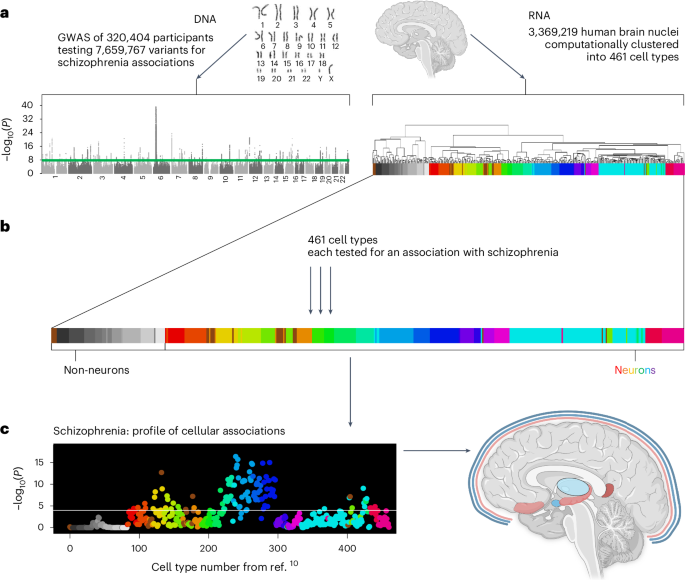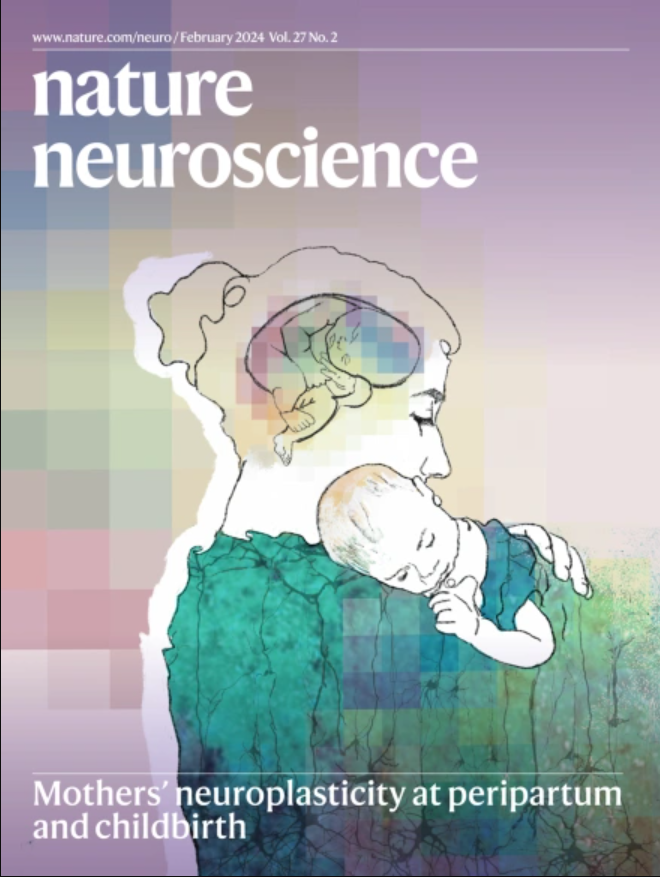Mapping the cellular etiology of schizophrenia and complex brain phenotypes
IF 21.2
1区 医学
Q1 NEUROSCIENCES
引用次数: 0
Abstract
Psychiatric disorders are multifactorial and effective treatments are lacking. Probable contributing factors to the challenges in therapeutic development include the complexity of the human brain and the high polygenicity of psychiatric disorders. Combining well-powered genome-wide and brain-wide genetics and transcriptomics analyses can deepen our understanding of the etiology of psychiatric disorders. Here, we leverage two landmark resources to infer the cell types involved in the etiology of schizophrenia, other psychiatric disorders and informative comparison of brain phenotypes. We found both cortical and subcortical neuronal associations for schizophrenia, bipolar disorder and depression. These cell types included somatostatin interneurons, excitatory neurons from the retrosplenial cortex and eccentric medium spiny-like neurons from the amygdala. In contrast we found T cell and B cell associations with multiple sclerosis and microglial associations with Alzheimer’s disease. We provide a framework for a cell-type-based classification system that can lead to drug repurposing or development opportunities and personalized treatments. This work formalizes a data-driven, cellular and molecular model of complex brain disorders. Duncan and colleagues link specific human brain cell types to schizophrenia and other complex brain phenotypes, providing mechanistic insights and a cellular taxonomy for psychiatric disorders.


绘制精神分裂症和复杂脑表型的细胞病因图谱
精神疾病是多因素的,缺乏有效的治疗方法。导致治疗发展面临挑战的可能因素包括人类大脑的复杂性和精神疾病的高多基因性。结合强大的全基因组和全脑遗传学和转录组学分析可以加深我们对精神疾病病因学的理解。在这里,我们利用两个具有里程碑意义的资源来推断与精神分裂症、其他精神疾病的病因有关的细胞类型,并对大脑表型进行信息比较。我们发现皮层和皮层下神经元与精神分裂症、双相情感障碍和抑郁症都有关联。这些细胞类型包括生长抑素中间神经元、来自脾后皮层的兴奋性神经元和来自杏仁核的偏心中棘样神经元。相反,我们发现T细胞和B细胞与多发性硬化症有关,小胶质细胞与阿尔茨海默病有关。我们为基于细胞类型的分类系统提供了一个框架,可以导致药物再利用或开发机会和个性化治疗。这项工作正式确立了一个数据驱动的、复杂大脑疾病的细胞和分子模型。
本文章由计算机程序翻译,如有差异,请以英文原文为准。
求助全文
约1分钟内获得全文
求助全文
来源期刊

Nature neuroscience
医学-神经科学
CiteScore
38.60
自引率
1.20%
发文量
212
审稿时长
1 months
期刊介绍:
Nature Neuroscience, a multidisciplinary journal, publishes papers of the utmost quality and significance across all realms of neuroscience. The editors welcome contributions spanning molecular, cellular, systems, and cognitive neuroscience, along with psychophysics, computational modeling, and nervous system disorders. While no area is off-limits, studies offering fundamental insights into nervous system function receive priority.
The journal offers high visibility to both readers and authors, fostering interdisciplinary communication and accessibility to a broad audience. It maintains high standards of copy editing and production, rigorous peer review, rapid publication, and operates independently from academic societies and other vested interests.
In addition to primary research, Nature Neuroscience features news and views, reviews, editorials, commentaries, perspectives, book reviews, and correspondence, aiming to serve as the voice of the global neuroscience community.
 求助内容:
求助内容: 应助结果提醒方式:
应助结果提醒方式:


